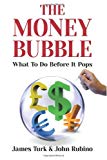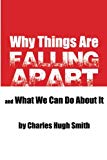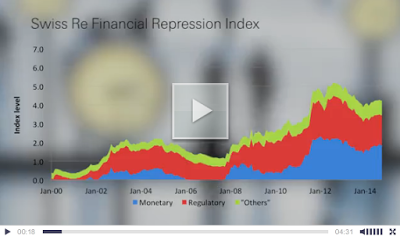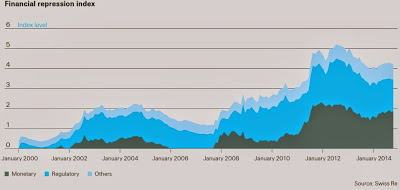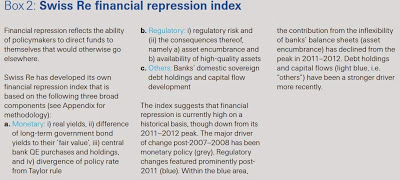|
JOHN RUBINO'SLATEST BOOK |
||||||||||||||||||||||||||||||||||||||||||||||||||||||||||||||||||||||||||||||||||||||||||||||||||||||||||||||||||||||||||||||||||||||||||||||||||||||||||||||||||||||||||||||||||||||||||||||||||||||||||||||||||||||||||||||||||||||||||||||||||||||||||||||||
"MELT-UP MONITOR " Meltup Monitor: FLOWS - The Currency Cartel Carry Cycle - 09 Dec 2013 Meltup Monitor: FLOWS - Liquidity, Credit & Debt - 04 Dec 2013 Meltup Monitor: Euro Pressure Going Critical - 28- Nov 2013 Meltup Monitor: A Regression-to-the-Exponential Mean Required - 25 Nov 2013
|
"DOW 20,000 " Lance Roberts Charles Hugh Smith John Rubino Bert Dohman & Ty Andros
|
HELD OVER
Currency Wars
Euro Experiment
Sultans of Swap
Extend & Pretend
Preserve & Protect
Innovation
Showings Below
"Currency Wars "
|
"SULTANS OF SWAP" archives open ACT II ACT III ALSO Sultans of Swap: Fearing the Gearing! Sultans of Swap: BP Potentially More Devistating than Lehman! |
"EURO EXPERIMENT"
archives open EURO EXPERIMENT : ECB's LTRO Won't Stop Collateral Contagion!
EURO EXPERIMENT: |
"INNOVATION"
archives open |
"PRESERVE & PROTE CT"
archives open |

Mon. July 6th, 2015
Follow Our Updates
on TWITTER
https://twitter.com/GordonTLong
AND FOR EVEN MORE TWITTER COVERAGE
![]()
| JULY | ||||||
| S | M | T | W | T | F | S |
| 1 | 2 | 3 | 4 | |||
| 5 | 6 | 7 | 8 | 9 | 10 | 11 |
| 12 | 13 | 14 | 15 | 16 | 17 | 18 |
| 19 | 20 | 21 | 22 | 23 | 24 | 25 |
| 26 | 27 | 28 | 29 | 30 | ||
KEY TO TIPPING POINTS |
| 1- Bond Bubble |
| 2 - Risk Reversal |
| 3 - Geo-Political Event |
| 4 - China Hard Landing |
| 5 - Japan Debt Deflation Spiral |
| 6- EU Banking Crisis |
| 7- Sovereign Debt Crisis |
| 8 - Shrinking Revenue Growth Rate |
| 9 - Chronic Unemployment |
| 10 - US Stock Market Valuations |
| 11 - Global Governance Failure |
| 12 - Chronic Global Fiscal ImBalances |
| 13 - Growing Social Unrest |
| 14 - Residential Real Estate - Phase II |
| 15 - Commercial Real Estate |
| 16 - Credit Contraction II |
| 17- State & Local Government |
| 18 - Slowing Retail & Consumer Sales |
| 19 - US Reserve Currency |
| 20 - US Dollar Weakness |
| 21 - Financial Crisis Programs Expiration |
| 22 - US Banking Crisis II |
| 23 - China - Japan Regional Conflict |
| 24 - Corruption |
| 25 - Public Sentiment & Confidence |
| 26 - Food Price Pressures |
| 27 - Global Output Gap |
| 28 - Pension - Entitlement Crisis |
| 29 - Central & Eastern Europe |
| 30 - Terrorist Event |
| 31 - Pandemic / Epidemic |
| 32 - Rising Inflation Pressures & Interest Pressures |
| 33 - Resource Shortage |
| 34 - Cyber Attack or Complexity Failure |
| 35 - Corporate Bankruptcies |
| 36 - Iran Nuclear Threat |
| 37- Finance & Insurance Balance Sheet Write-Offs |
| 38- Government Backstop Insurance |
| 39 - Oil Price Pressures |
| 40 - Natural Physical Disaster |
Reading the right books?
No Time?
We have analyzed & included
these in our latest research papers Macro videos!
![]()
OUR MACRO ANALYTIC
CO-HOSTS
John Rubino's Just Released Book
Charles Hugh Smith's Latest Books
Our Macro Watch Partner
Richard Duncan Latest Books
MACRO ANALYTIC
GUESTS
F William Engdahl
OTHERS OF NOTE
Book Review- Five Thumbs Up
for Steve Greenhut's
Plunder!
TODAY'S TIPPING POINTS
|
Have your own site? Offer free content to your visitors with TRIGGER$ Public Edition!
Sell TRIGGER$ from your site and grow a monthly recurring income!
Contact [email protected] for more information - (free ad space for participating affiliates).
HOTTEST TIPPING POINTS |
Theme Groupings |
||||||||||
We post throughout the day as we do our Investment Research for: LONGWave - UnderTheLens - Macro
|
|||||||||||
TIPPING POINTS |
|||||||||||
|
CHECK OUT OUR PAGE DEDICATED TO FINANCIAL REPRESSION The Financial Repression AuthorityTM
|
|||||||||||
| THESIS & THEMES | |||||||||||
FINANCIAL REPRESSION - In A World Of Artificial Liquidity – Cash Is King In A World Of Artificial Liquidity – Cash Is KingNomi Prins: In A World Of Artificial Liquidity – Cash Is King 07-04-15 Submitted by Nomi Prins via PeakProsperity.com, Global central banks are afraid. Before Greece tried to stand up to the Troika, they were merely worried. Now it’s clear that no matter what they tell themselves and the world about the necessity or even righteousness of their monetary policies, liquidity can still disappear in an instant. Or at least, that’s what they should be thinking. The Federal Reserve and US government led policy of injecting liquidity into the US and then into the worldwide financial system has resulted in the issuance of trillions of dollars of debt, recycling it through the largest private banks, and driving rates to 0% -- or below. The combined book of debt that the Fed and European Central Bank (ECB) hold is $7 trillion. None of that has gone remotely into fixing the real global economy. Nor have the banks that have ben aided by this cheap money increased lending to the real economy. Instead, they have hoarded their bounty of cash. It’s not so much whether this game can continue for the near future on an international scale. It can. It is. The bigger problem is that central banks have no plan B in the event of a massive liquidity event. Some central bank entity leaders have admitted this. IMF chief, Christine Lagarde for instance, warned Federal Reserve Chair, Janet Yellen that potential US rate hikes implemented too soon, would incite greater systemic calamity. She’s not wrong. That’s what we’ve come to: a financial system reliant on external stimulus to survive. These “emergency” measures were supposed to have healed the problems that caused the financial crisis of 2008 -- the excessive leverage, the toxic assets wrapped in complex derivatives, the resultant credit and liquidity crunch that occurred when banks lost faith in each other. Meanwhile, the infusion of cheap money and liquidity into banks gave a select few of them more power over a greater pool of capital than ever. Stock and bond markets skyrocketed as a result of this unprecedented central bank support. QE-infinity isn’t a solution -- it’s a deflection. It’s a form of financial subterfuge that causes extra problems. These range from asset bubbles to the inability of pension and life insurance funds to source longer term less risky long-term assets like government bonds, that pay enough interest for them to meet liabilities. They are thus at risk of rapid future deterioration and more shortfalls precisely because they have nothing to invest in besides more risky stock and lower-rated bond markets. Even the latest Bank of International Settlement (BIS) 85th Annual Report revealed the extent to which global entities supervising the banking system are worried. They harbor growing fears about greater repercussions from this illusion of market health (echoing concerns I and others have been writing about for the past seven years.) The BIS, or bank for the central banks was established during the global Great Depression in 1930 in Basel, Switzerland, when bank runs on people’s deposits were the norm. The body no longer buys into zero-interest rate policy as an economic cure-all. In their words, “Globally, interest rates have been extraordinarily low for an exceptionally long time, in nominal and inflation-adjusted terms, against any benchmark. Such low rates are the remarkable symptom of a broader malaise in the global economy.” They go on to note the obvious, “The economic expansion is unbalanced, debt burdens and financial risks are still too high, productive growth too low, and the room for maneuvering in macroeconomic policy too limited. The unthinkable risks becoming routine and being perceived as the new normal.” These are troubling words coming from an organization that would have much preferred to deem central bank policies a success. Yet the BIS also states, “Global financial markets remain dependent on central banks.” Dependent is a strong word. How quickly the idea of free markets has been turned on its head. Further, the BIS says, “Central bank balance sheets remain at unprecedented high levels; and they grew even larger in several jurisdictions where the ultra low policy rate environments were reinforced with large purchases of domestic and foreign assets.” Central banks are not yet there, but rising volatility is indicative of the accelerating approach to the nowhere left to go mark from a monetary policy perspective. This, after seven years of a reckless Anti-Main Street, inequality and instability inducing, policy. Not only have the major banks been the main recipient of manufactured liquidity, they have also received consolidated access to our deposits, which they can use like hostages to negotiate future bailout situations. Elite bankers moan about the extra regulations they have had to endure in the wake of the financial crisis, while scooping up cash dispersed under the guise of stimulating the general economy. Central banks seek fresh ways to keep the party going as countries like Greece shut down banks to contain capital flight, and places like Puerto Rico and multiple states and municipalities face economic ruin. But they are clueless as to what to do. In this cauldron of instability and lack of leadership, cash is the one remaining financial possession that Main Street can translate into goods, services and security. That’s why private banks want more control over it. Banks Want Your Cash For Their Latent Emergencies One of the most inane reasons cited for restricting cash withdrawals for normal people is that they all might turn out to be drug dealers or terrorists. Meanwhile, drug-dealing-money-laundering terrorists tend to get away with it anyway, by sheer ability to use a plethora of banks and off shore havens to diffuse cash around the globe. Every so often, years after the fact, some bank perpetrators receive money-laundering fines. For average depositors though, these are excuses for a bureaucracy built upon limiting access to cash whether from an ATM (many have $500 per day limits, some have less) or an account (withdrawals above a certain level get reported to the IRS). As Charles Hugh Smith wrote at Peak Prosperity recently, there’s a difference between physical cash (the kind you can touch and use immediately) and the electronic kind, associated with your bank balance or credit card cash advance limit. If you hold it, you have it – even if keeping it in a bank means it’s probably slammed with various fees. Banks, on the other hand, can leverage your deposits or cash, even while complying with various capital reserve requirements. That’s not new. But the expanding debates about how much of your cash you get to withdraw at any given moment, is. The notion of a bail-in, or recourse to people’s deposits, is related to the idea of restricting the movement, or existence, of physical cash. Bail-ins, like any cash limitations, imply that if a bank needs emergency liquidity, your deposits are the place to find it, which has negative repercussion on your own solvency. This is exactly what the Glass-Steagall Act of 1933, coupled with the creation of the FDIC sought to avoid – banks confiscating your money at the worst possible times. The ‘war on cash’ is thus really a war on the difference between the money you can hold on to and the money the banks can take away from you. The existence of this cash debate underscores the need for a personal policy of cash extraction from the big banks. Do you have one? In Part 2: They're Coming For Your Cash we detail out the growing threats to the liquidity that sustains the modern global banking system, and why it's more crucial than ever for people to consider extracting a portion of cash from their bank accounts. As existing liquidity streams dry up (as they are beginning to around the world), increasingly desperate banks will turn to the largest and most convenient source they know of: the collective cash savings we have on deposit with them. Click here to read Part 2 of this report (free executive summary, enrollment required for full access) |
07-06-15 | THEMES | |||||||||
| FINANCIAL REPRESSION - In A World Of Artificial Liquidity – Cash Is King | 07-06-15 | THEMES |
FINANCIAL REPRESSION |
||||||||
Posted by Cliff Küle at 7/05/2015 04:48:00 PM Sounding the Alarm on Financial RepressionSwiss Re video highlights the recent meeting they held with experts voicing concerns about the ongoing use of unconventional policies .. financial repression is causing financial market distortions & poses a serious risk to financial stability .. These unconventional policies have pushed institutional investors into holding government debt. As a result they have less money available for productive investment, such as infrastructure projects .. "It means that there's a global search for yield. That possibly leads to a misallocation of resources," says Douglas Flint, Group Chairman of HSBC .. Jean-Claude Trichet, Chairman of theGroup of Thirty affirms the risks. LINK HERE to the article & video Swiss Re: Financial Repression has cost U.S. Savers $470 BillionSwiss Re report highlights how artificially low interest rates have cost U.S. savers U.S.$470 Billion .. the report also explains how financial repression has exacerbated wealth/income inequality .. Swiss Re has also crafted a "Financial Repression Index" - see above .. "Looking ahead, financial repression is likely to remain a key tool for policymakers given the moderate global growth outlook and high public debt overhang. But, as outlined in this paper, financial repression comes with significant costs. Whether the costs outweigh the benefits largely depends on the ability of governments to take advantage of the low interest rate environment by implementing the right structural reforms. So far, their record for doing so has not been comforting, as also noted by the IMF .. Additional research on financial repression could be linked to the impact of an aging society on the broader economic and financial market environment and hence the optimal policy mix. Finally, a largely unexplored area is the consequence – especially longer-term – of public authorities acting as dominant players in their own bond markets. How does this affect private capital markets, and how severe are the distortions in price formation, investment decisions, allocation to productive areas and capital flows more generally?" .. the report includes a Foreward bySwiss Re Group Chief Investment Officer Guido Fürer. LINK HERE to get the report
|
|||||||||||
"BEST OF THE WEEK " MOST CRITICAL TIPPING POINT & THEMES ARTICLES THIS WEEK July 5th, 2015 - July 11th, 2015 |
|||||||||||
| BOND BUBBLE | 1 | ||||||||||
| RISK REVERSAL - WOULD BE MARKED BY: Slowing Momentum, Weakening Earnings, Falling Estimates | 2 | ||||||||||
| GEO-POLITICAL EVENT | 3 | ||||||||||
| CHINA BUBBLE | 4 | ||||||||||
| JAPAN - DEBT DEFLATION | 5 | ||||||||||
EU BANKING CRISIS |
6 |
||||||||||
| TO TOP | |||||||||||
| MACRO News Items of Importance - This Week | |||||||||||
GLOBAL MACRO REPORTS & ANALYSIS |
|||||||||||
US ECONOMIC REPORTS & ANALYSIS |
|||||||||||
| CENTRAL BANKING MONETARY POLICIES, ACTIONS & ACTIVITIES | |||||||||||
| Market | |||||||||||
| TECHNICALS & MARKET |
|
||||||||||
| COMMODITY CORNER - AGRI-COMPLEX | PORTFOLIO | ||||||||||
| SECURITY-SURVEILANCE COMPLEX | PORTFOLIO | ||||||||||
| THEMES | |||||||||||
| THESIS - Mondays Posts on Financial Repression & Posts on Thursday as Key Updates Occur | |||||||||||
| 2015 - FIDUCIARY FAILURE | 2015 | THESIS 2015 |  |
||||||||
| 2014 - GLOBALIZATION TRAP | 2014 |  |
|||||||||
|
2013 2014 |
|||||||||||
2011 2012 2013 2014 |
|||||||||||
| THEMES - Normally a Thursday Themes Post & a Friday Flows Post | |||||||||||
I - POLITICAL |
|||||||||||
| CENTRAL PLANNING - SHIFTING ECONOMIC POWER - STATISM | THEME | ||||||||||
- - CORRUPTION & MALFEASANCE - MORAL DECAY - DESPERATION, SHORTAGES. |
THEME |  |
|||||||||
| - - SECURITY-SURVEILLANCE COMPLEX - STATISM | M | THEME | |||||||||
| - - CATALYSTS - FEAR (POLITICALLY) & GREED (FINANCIALLY) | G | THEME | |||||||||
II-ECONOMIC |
|||||||||||
| GLOBAL RISK | |||||||||||
| - GLOBAL FINANCIAL IMBALANCE - FRAGILITY, COMPLEXITY & INSTABILITY | G | THEME | |||||||||
| - - SOCIAL UNREST - INEQUALITY & A BROKEN SOCIAL CONTRACT | US | THEME | |||||||||
| - - ECHO BOOM - PERIPHERAL PROBLEM | M | THEME | |||||||||
| - -GLOBAL GROWTH & JOBS CRISIS | |||||||||||
| - - - PRODUCTIVITY PARADOX - NATURE OF WORK | THEME | MACRO w/ CHS |
|||||||||
| - - - STANDARD OF LIVING - EMPLOYMENT CRISIS, SUB-PRIME ECONOMY | US | THEME | MACRO w/ CHS |
||||||||
III-FINANCIAL |
|||||||||||
| FLOWS -FRIDAY FLOWS | MATA RISK ON-OFF |
THEME | |||||||||
| CRACKUP BOOM - ASSET BUBBLE | THEME | ||||||||||
| SHADOW BANKING - LIQUIDITY / CREDIT ENGINE | M | THEME | |||||||||
| GENERAL INTEREST |
|
||||||||||
| STRATEGIC INVESTMENT INSIGHTS - Weekend Coverage | |||||||||||
|
SII | ||||||||||
|
SII | ||||||||||
|
SII | ||||||||||
|
SII | ||||||||||
| TO TOP | |||||||||||
Read More - OUR RESEARCH - Articles Below
Tipping Points Life Cycle - Explained
Click on image to enlarge
TO TOP
�
TO TOP
